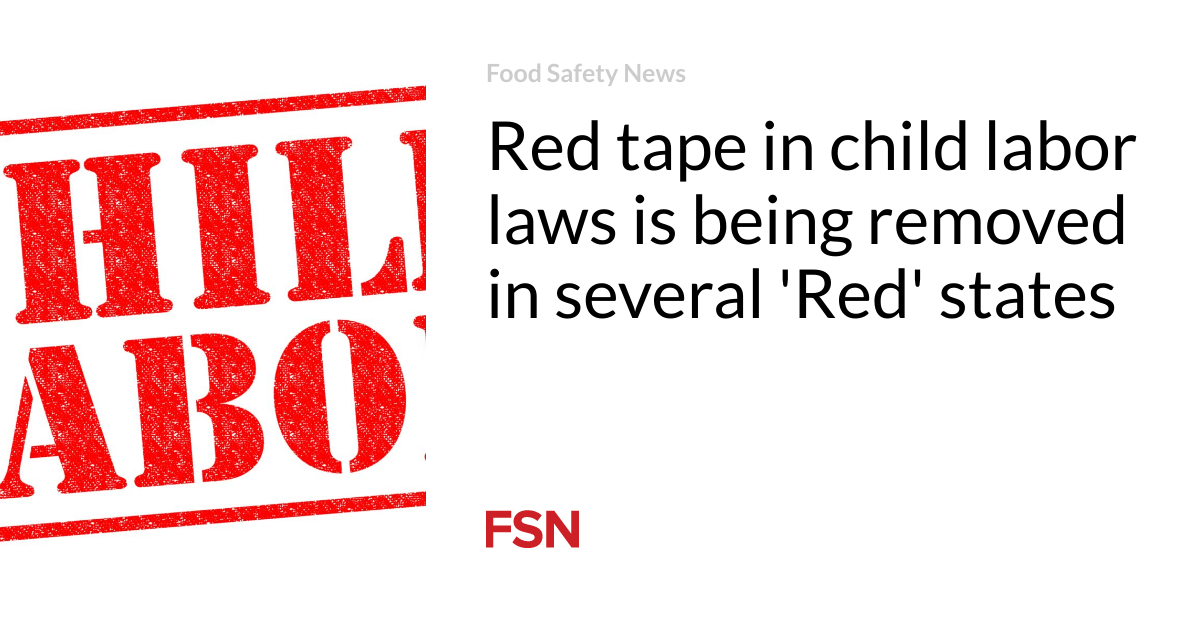Red tape in child labor laws is being removed in several 'Red' states | Food Safety News

In Arkansas, Gov. Sarah Sanders has signed the Youth Hiring Act of 2023, removing the requirement that a parent or guardian consent to a child starting a job or getting an employment certificate.
In Iowa, there's a bill that would allow 14 and 15 year olds to work specific jobs in the meat packing industry. It also protects employers from cvil liability if any of the children employed are injured or killed on the job,
In Ohio the state Senate has passed a bill loosening labor protections for minors. It would allow 14 and 15 year olds to work until 9 pm any time of the year if they have permission from their legal guardian. Current Ohio law prohibits kids under the age of 16 from working that late during the school year. The bill would still limit children younger than 16 from working more than three hours a day on a school day and for more than 18 hours a week during the school year.
These examples of a trend toward loosing child labor laws, largely by Republicans in so-called Red states is catching many off guard. That's because prior to the current legislative session, there was proof of widespread use of child labor in dangerous sanitation jobs the meatpacking industry. Oversight of jobs involving food safety often involved corrosive chemicals and dangerous machinery.
But the Republicans involve say they are just cutting some of the red tape, endnote the underpinnings of their state child labor protections. Sanders says protecting kids is important, but so is removing burdens on parents who should not have to get the government's permission for their children to get a job.
The meatpacking industry's widespread reliance on child labor that resulted in its paying fines of $1.5 million and has also opened a probe by Homeland Security into human trafficking in meatpacking
Many of the millions who've entered the United States say they owe significant sums to the Mexican cartels, making them highly susceptible to human trafficking schemes. Yet there are no state reports of laws being strengthened to combat human trafficking
(To sign up for a free subscription to Food Safety News,click here)
This “Eyes on Trafficking” story is reprinted from its original online location.
Fair Use Notice: The PBJ Learning Knowledge Vault is dedicated to advancing understanding of various social justice issues, including human trafficking and related topics. Some of the material presented on this website may contain copyrighted material, the use of which has not always been specifically authorized by the copyright owner. We are making such material available in our efforts to promote education and awareness of these important issues. There is no other central database we are aware of, so we put this together for both historical and research purposes. Articles are categorized and tagged for ease of use. We believe that this constitutes a ‘fair use' of any such copyrighted material as provided for in section 107 of the US Copyright Law. In accordance with Title 17 U.S.C. Section 107, the material on this site is distributed without profit to those who have expressed a prior interest in receiving the included information for research and educational purposes. For more information on fair use, please visit: “17 U.S. Code § 107 – Limitations on exclusive rights” on Cornell Law School's Legal Information Institute.
 ABOUT PBJ LEARNING
ABOUT PBJ LEARNING
PBJ Learning is a leading provider of online human trafficking training, focusing on awareness and prevention education. Their interactive Human Trafficking Essentials online course is used worldwide to educate professionals and individuals how to recognize human trafficking and how to respond to potential victims. Learn on any web browser (even your mobile phone) at any time.
More stories like this can be found in your PBJ Learning Knowledge Vault.
EYES ON TRAFFICKING
This “Eyes on Trafficking” story is reprinted from its original online location.
ABOUT PBJ LEARNING
PBJ Learning is a leading provider of online human trafficking training, focusing on awareness and prevention education. Their interactive Human Trafficking Essentials online course is used worldwide to educate professionals and individuals how to recognize human trafficking and how to respond to potential victims. Learn on any web browser (even your mobile phone) at any time.
More stories like this can be found in your PBJ Learning Knowledge Vault.
